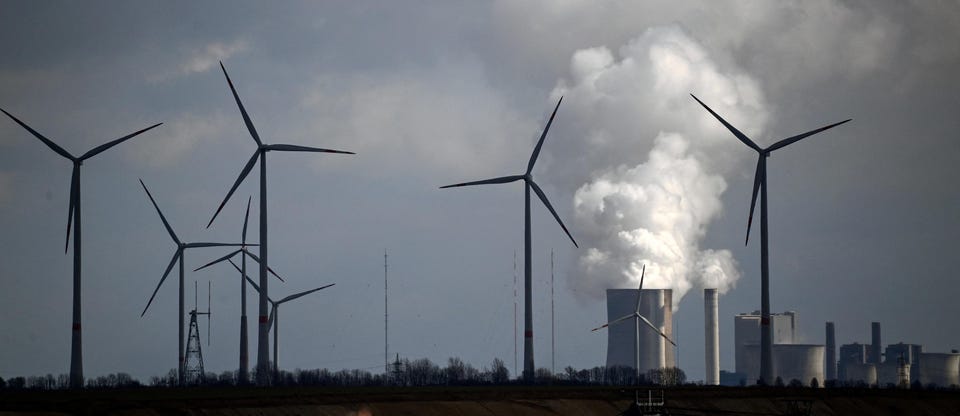Sustainability Did Europe Move To Renewables Too Fast Or Too Slow (Or Just Right?) Jeff McMahon Senior Contributor Opinions expressed by Forbes Contributors are their own. From Chicago, I write about climate change, green technology, energy. Following New! Follow this author to stay notified about their latest stories.
Got it! Oct 3, 2022, 12:00am EDT | New! Click on the conversation bubble to join the conversation Got it! Share to Facebook Share to Twitter Share to Linkedin Wind turbines are seen near the coal-fired power station Neurath of German energy giant RWE in . . .
[+] Garzweiler, Germany. (Photo by INA FASSBENDER/AFP via Getty Images) AFP via Getty Images There’s a popular narrative circulating—particularly around the fossil-fuel and nuclear industries—that Europe is facing an energy crisis because it moved to renewables too fast. A keynote speaker circled the idea last week at the Baker Institute’s Annual Energy Summit in Houston.
The economist Robert Kaplan, former president of the Federal Reserve Bank of Dallas, cited the soaring cost of energy amid a slew of economic headwinds , including the aging population, slowing workforce growth, high government debt, and a reversal of globalization that makes it harder to source rare metals and semiconductors. “If you’re in the middle of this kind of crisis and dilemma, you have to think with a clean sheet of paper: what are all the options you have to deal with this crisis?” Kaplan said. “And I’m just saying let’s put a few more back on the table, including in Europe, and yes, (Europe) should be a warning sign to us that we need to put a few more variables on the table, because this is a very challenging situation we’re facing, very challenging.
” A moderator clarified: “So you’re basically talking about leveraging the full portfolio of energy options. ” “Including nuclear,” Kaplan agreed. “I’m asking the question should we be producing more oil and gas in the next five years understanding, yes it will phase out, these will be stranded assets,” he said.
“But I think I’m finding out there there’s not really a safe space to have that debate. . .
. I don’t have the answers but I think you have to be free to honestly ask the questions, and I’m talking about a more integrated plan that gets us through the next five or ten years until alternatives become more viable, battery storage becomes more advanced, and we get farther along in this curve. ” At a panel afterward, Meghan McElvy, a partner in the law firm of Baker Botts, was more blunt: “We sort of look around and see what’s happening in Europe, and like Mr Kaplan said it is scary—it should scare us—and it should be a warning maybe they swung the pendulum too far too fast and you know we’re seeing them pay the price for that.
” She asked the renewables representative on the panel: “What is a sensible yet aggressive approach to achieve these energy transition goals in a way that it balances things with energy security?” MORE FOR YOU Is Carbon Capture Another Fossil Fuel Industry Con? Sustainable Fashion Wants Brands To Redefine Business Growth Trouble With Predicting Future Of Transportation Is That Today Gets In The Way That panelist was Meghan Nutting, the executive vice president for government and regulatory affairs at Sunnova, a Houston-based residential solar developer. “I think I take away maybe a different perspective from that,” Nutting said. “Europe is incredibly dependent on Russian gas, now is being cut off from Russian gas, and is facing some energy crises.
Had Europe transitioned more quickly to a different type of energy that was domestically produced and used, they wouldn’t be so worried about the costs of gas and access to gas. ” Energy prices have soared, Nutting said, primarily because of the cost of natural gas. While the U.
S. is one of the largest exporters of natural gas, she added, it is entangled in that market with “unstable and despotic governments,” including Russia, Venezuela and Saudi Arabia. “When you think about renewables,” she said, “they are built locally and that energy is used locally.
” It costs less to build a solar plant, she said, than to buy the fuel for a natural-gas plant. Asked about the intermittency of solar and wind, Nutting pointed out that during the Texas freeze last year most of the outages were due to natural-gas failures. As far as nuclear goes, she cited the two nuclear reactors Southern Company is building in Georgia which she said are six years overdue and $16 billion over budget.
“So every type of energy source sort of has its intermittency problems. ” Renewables are projected to supply 24 percent of U. S.
energy next year, Nutting said, more than coal. “So I think at this point it’s probably time to stop calling renewables ‘alternative energy. ’ We are very mainstream at this point.
” In this file photo from 2011, (From L to R, first row) French Prime Minister Francois Fillon , . . .
[+] German Chancellor Angela Merkel, Dutch Prime Minister Mark Rutte, Russian President Dmitry Medvedev and European Union Energy Commissioner Guenther Oettinger turn a wheel to symbolically start the flow of gas through the Nord Stream Baltic Sea gas pipeline. (Photo by Sean Gallup/Getty Images) Getty Images Follow me on Twitter or LinkedIn . Check out my website .
Jeff McMahon Editorial Standards Print Reprints & Permissions.
From: forbes
URL: https://www.forbes.com/sites/jeffmcmahon/2022/10/03/did-europe-move-to-renewables-too-fast-or-too-slow-or-just-right/



